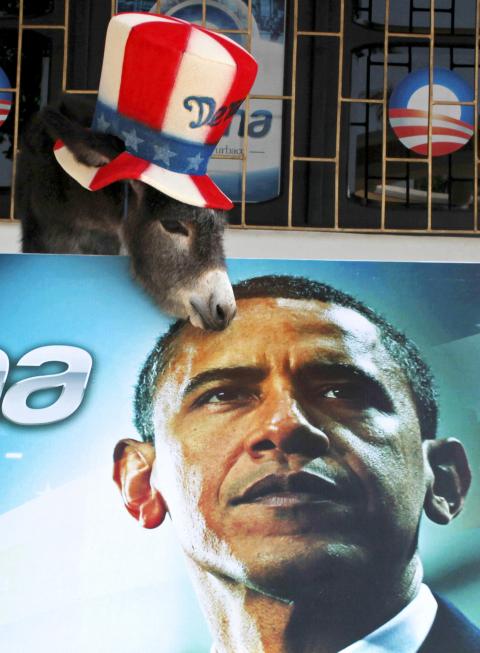Backstage was chaotic. Barack Obama was fighting with his handler. Shakira had been happily eating off the floor but became surly when she was interrupted. It took three men to push her up the ramp onto the makeshift stage.
Donkeys and beauty contests are both common sights in rural Colombia, but only in the small Caribbean town of San Antero are the two combined in a pageant where locals dress their animals as celebrities and slyly poke fun at Colombian society.
“This is our homage to the donkey because they are the means of transport for our small farmers and fishermen — and we’re here to enjoy the party!” said Keila Murillo, standing on the sidelines of the chaotic parade of donkeys through the town earlier this month.

Photo: Reuters
Donkeys are prized in rural areas of a country where hundreds of villages are only accessible by jungle trails or mountain paths. “The donkey is essential for the life of the countryside and our economy,” said local businessman Cristobal Carvajal who founded the festival 25 years ago.
Participants spend up to a year designing and creating their donkeys’ costumes. The stakes are high: first place in the donkey pageant nets about US$1,700, or around six months salary for most Colombians.
When the real US President Barack Obama visited Colombia last month, a local politician tried to give him a baby donkey. Obama did not take the donkey, but sent a letter of thanks.
At the pageant, Obama’s donkey namesake was draped in a US flag and a USA tie. Others carried sharper political messages: one wore a dress with “No more kidnappings” written along the side — a reference to the scores of people kidnapped for ransom by criminals and factions in Colombia’s four-decade civil war.
Three donkeys were dressed to represent the hundreds of thousands displaced during the last rainy season — the worst natural disaster in the country’s history. Hundreds were killed in the floods, and the donkeys’ costumes reflected a widely-felt belief that the region had been abandoned by Colombia’s central government. One donkey was weighed down under a collection of old household goods, an old television, a broken radio and a fan, surrounded by a destitute family who carried signs saying: “Mr President, remember us. We are Colombia too.”
“People have to realize that a tragedy happened. The rainy season passed and the displaced are forgotten, but the problem hasn’t gone away,’’ said Nestor Pinzon, dressed as a member of the destitute family.
The sly humor is part of the pageant, said Roberto Montes, one of the judges. “Through the donkeys, there is criticism of society and how people are mistreated.”
In the end, the prize went to the donkey dressed as a famous Colombian preacher.
Barack Obama’s handler, who seemed as if he had been drinking, stormed off. The other donkeys seemed unperturbed and continued eating grass.

Desperate dads meet in car parks to exchange packets; exhausted parents slip it into their kids’ drinks; families wait months for prescriptions buy it “off label.” But is it worth the risk? “The first time I gave him a gummy, I thought, ‘Oh my God, have I killed him?’ He just passed out in front of the TV. That never happens.” Jen remembers giving her son, David, six, melatonin to help him sleep. She got them from a friend, a pediatrician who gave them to her own child. “It was sort of hilarious. She had half a tub of gummies,

June 23 to June 29 After capturing the walled city of Hsinchu on June 22, 1895, the Japanese hoped to quickly push south and seize control of Taiwan’s entire west coast — but their advance was stalled for more than a month. Not only did local Hakka fighters continue to cause them headaches, resistance forces even attempted to retake the city three times. “We had planned to occupy Anping (Tainan) and Takao (Kaohsiung) as soon as possible, but ever since we took Hsinchu, nearby bandits proclaiming to be ‘righteous people’ (義民) have been destroying train tracks and electrical cables, and gathering in villages

The wide-screen spectacle of Formula One gets a gleaming, rip-roaring workout in Joseph Kosinski’s F1, a fine-tuned machine of a movie that, in its most riveting racing scenes, approaches a kind of high-speed splendor. Kosinski, who last endeavored to put moviegoers in the seat of a fighter jet in Top Gun: Maverick, has moved to the open cockpits of Formula One with much the same affection, if not outright need, for speed. A lot of the same team is back. Jerry Bruckheimer produces. Ehren Kruger, a co-writer on Maverick, takes sole credit here. Hans Zimmer, a co-composer previously, supplies the thumping

Swooping low over the banks of a Nile River tributary, an aid flight run by retired American military officers released a stream of food-stuffed sacks over a town emptied by fighting in South Sudan, a country wracked by conflict. Last week’s air drop was the latest in a controversial development — private contracting firms led by former US intelligence officers and military veterans delivering aid to some of the world’s deadliest conflict zones, in operations organized with governments that are combatants in the conflicts. The moves are roiling the global aid community, which warns of a more militarized, politicized and profit-seeking trend